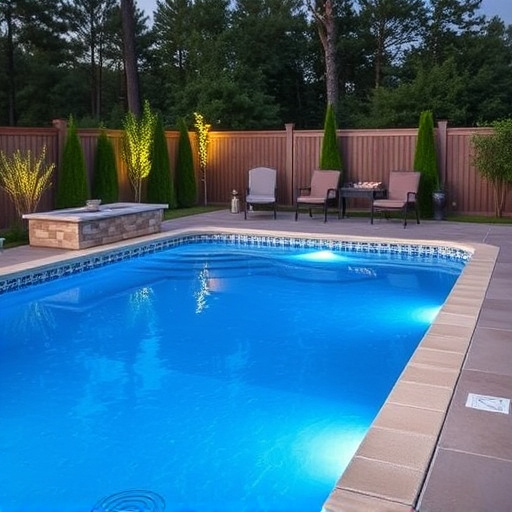Inground pool security is enhanced by installing specialized swimming pool alarms that detect unauthorized access and unexpected movements, offering immediate alerts via control panels or remote monitoring. These alarms, including motion sensors, water-level, and impact sensors, are crucial for protecting against accidental drowning, especially when combined with strategic lighting and natural barriers. Regular maintenance ensures alarm effectiveness, while wireless systems integrate seamlessly into existing home security setups, providing comprehensive protection tailored to each pool's unique layout and surroundings.
Inground pools offer a refreshing retreat, but they also pose potential safety risks. Understanding and mitigating these dangers is crucial for responsible pool ownership. This guide delves into the world of swimming pool alarms designed specifically for inground pools, exploring various types, installation, maintenance, and significant benefits. By considering key factors when choosing the right alarm system, you can enhance your pool’s security, ensuring peace of mind for you and your loved ones. Implement these measures to transform your inground pool into a safer haven.
Understanding Inground Pool Security Risks
Inground pools present unique security challenges that require proactive measures to ensure safety, especially considering their size and often remote locations. One of the primary risks is unauthorized access, which can be mitigated with robust security systems tailored for inground pools. Swimming pool alarms for inground pools are an excellent first line of defense, designed to detect intrusions and alert homeowners or authorities promptly. These alarms can include sophisticated sensors that trigger when movement is detected outside expected parameters, such as after-hours or unsupervised access.
Additionally, incorporating surveillance cameras with motion detection capabilities enhances security by providing visual evidence and deterring potential intruders. Landscaping modifications, such as strategically placed lighting and natural barriers, further contribute to overall pool security. By understanding and addressing these risks, homeowners can create a safer environment for themselves and their families, enjoying their inground pools with peace of mind.
Types of Swimming Pool Alarms for Inground Pools
Inground pool security is a vital consideration for any homeowner with a swimming pool. One of the most effective ways to ensure safety is through the installation of swimming pool alarms. These devices are designed to detect unauthorized entry into the pool area and provide an immediate alert, giving you peace of mind and potentially saving lives.
There are several types of swimming pool alarms available for inground pools, each offering unique features and benefits. Some common options include motion sensors that trigger alerts when detecting movement in or near the pool, water-level sensors that monitor changes in water depth, and impact sensors that detect physical impacts or attempts to break through the pool barrier. These alarms can be connected to a control panel, which may also incorporate emergency call features, ensuring swift response in case of an incident.
Installation and Maintenance of Pool Alarms
When it comes to ensuring the safety of an in-ground swimming pool, installation of swimming pool alarms is a critical step. These alarms serve as early warning systems, detecting any unauthorized access or unexpected movement around the pool area. There are various types available, including motion sensors, door/gate sensors, and underwater alarms, each designed to complement the others for comprehensive security. Professional installation is recommended to ensure proper placement and functionality, tailored to the specific layout of the in-ground pool.
Regular maintenance is equally vital to keep swimming pool alarms effective. This includes checking battery life, testing sensors for accuracy, and ensuring all components are securely connected. Many alarm systems also offer remote monitoring capabilities, allowing pool owners to receive alerts on their phones if any sensors are triggered, enabling quick response times. Proper installation and consistent upkeep significantly enhance the security of in-ground pools, providing peace of mind for pool owners and ultimate protection for unwanted intruders.
Benefits of Implementing Pool Alarm Systems
Implementing pool alarm systems offers a multitude of benefits for homeowners with in-ground pools, providing enhanced safety and peace of mind. These advanced technologies act as a robust defense mechanism against accidental drowning, especially for young children or unsupervised individuals. Swimming pool alarms are designed to detect movement on the water’s surface, promptly alerting owners or designated caretakers through audible signals and even smartphone notifications.
With in-ground pools, these alarms serve as a crucial line of protection, ensuring swift response times in potentially dangerous situations. They encourage responsible pool ownership by promoting active supervision while also offering backup safety measures. Moreover, advanced swimming pool alarm systems can be integrated with existing security setups, contributing to a comprehensive home security network.
Choosing the Right Pool Alarm: Key Considerations
When selecting swimming pool alarms for inground pools, several key considerations come into play to ensure effective security. First and foremost, assess your pool’s unique features and surroundings. This includes factors like depth, shape, and nearby obstacles that might interfere with alarm placement or sensor function. Different types of pool alarms cater to various needs; for instance, underwater sensors are ideal for shallow areas, while surface-mounted alarms offer a broader range of protection.
Additionally, consider the level of protection required based on your pool’s accessibility. If your inground pool is easily visible and within close proximity to your home, basic alarm systems might suffice. However, if it’s located further away or has limited visibility, investing in more advanced, wireless alarms that integrate with security systems can provide enhanced peace of mind. Always opt for reputable brands known for their reliable technology and user-friendly design.
